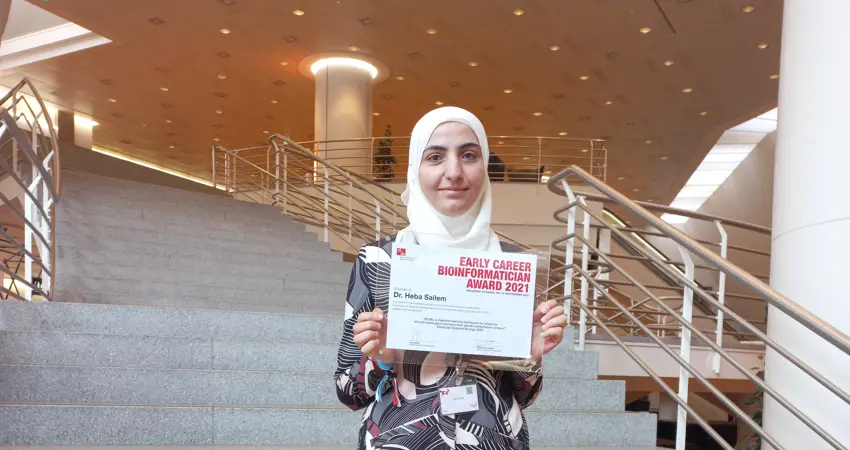08 Oct 2021
Dr Heba Sailem wins international award for work on gene functions
Sir Henry Wellcome Research Fellow Dr Heba Sailem wins the Early Bioinformatician Award at the Basel Computational Biology Conference.

Dr Heba Sailem receiving her award
The Swiss Institute of Bioinformatics has recognised the work of research fellow Dr Heba Sailem with the Early Bioinformatician Award.
Through the Sir Henry Wellcome Research Fellowship, Dr Sailem received funding to develop a machine learning approach that allows automated linking of microscopy-based phenotypes to gene functions. Phenotypes are the physical characteristics of the cell, such as an elongated cell versus round or cells forming colonies and tightly attached together versus cells spread apart. Gene functions describe the gene’s role, such as cell proliferation, cell arrangement, cell death or fighting infection.
“It is a great honour to be at the forefront of bioinformatics research and develop enabling technologies that have the potential to improve human health”
Dr Sailem explains the technique, “We induce gene loss and look at the cell under the microscope. We can infer what the gene is doing based on how the cell changes its appearance following its loss.”
“For example, if you don’t know what the role of baking powder is in cake baking, then you take it out of the recipe and observe what happens. The cake won’t rise, so you know this component is necessary for the cake to rise. If you do this for every ingredient, then you can assign function for every ingredient. The genes are the ingredients in my case and the cell phenotype is the outcome of gene activities.”
Sailem’s method was published in the leading journal Molecular Systems Biology in 2020. She says “Analysis of large-scale genetic screening datasets was a long-standing problem in the field of bioinformatics. These datasets were greatly underutilised due to challenges in interpreting analysis results. By developing a machine learning approach that integrates our existing knowledge of gene functions, I was able to implement an intelligent system that generates hypotheses on the meaning of certain biological phenotypes observed under the microscope.”
The work opens up many new ways to study gene functions, as it enables systematically predicting gene functions associated with a specific tissue type or disease. For example, her method revealed a new role for the genes responsible for our smell-sensing in the nose in colorectal tissue organisation which correlate with cancer progression. Heba explains, “Currently, gene ontologies provide the most standardised database of gene functions. Despite the intensive use of this database in interpreting large biological datasets, gene ontologies suffer from huge limitations as it generally offers gene annotations independent of tissue type or disease model.”
“I am very excited about the potential of this approach in advancing our understanding of cancer gene functions and finding new therapeutic targets”
Gene ontologies are databases that list all possible functions for each gene. However, they don’t provide the context in which the gene plays these functions. The problem is that the gene can have different functions in different tissues. Sailem continues, “So, we know that olfactory receptors sense the smell in the nose. But we also observe they are active in cancer cells. However, we don’t know what they are doing in cancer cells. Using my approach, we were able to infer that they affect how cells arrange together.”
Dr Sailem’s work provides this important context. She adds, “I am very excited about the potential of this approach in advancing our understanding of cancer gene functions and finding new therapeutic targets”
“It is a great honour to be at the forefront of bioinformatics research"
“If we know what genes do in the context of cancer then we can design drugs to target such a process. For example, we know cancer cells proliferate more (divide more) in uncontrolled ways. Knowing which genes responsible for that then we can design drugs that inhibit these genes. Or we can design drugs that affect cell ability to divide.”
Dr Heba Sailem received her award at the hybrid Basel Computational Biology Conference on 13th-15th September where she also delivered her award talk and discussed some of the remaining challenges that the field needs to address. She concludes, “It is a great honour to be at the forefront of bioinformatics research and develop enabling technologies that have the potential to improve human health”.
Dr Heba Sailem's talk on her award winning work




